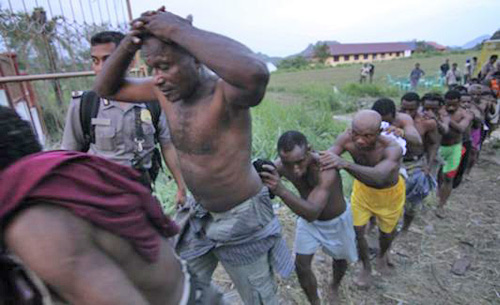
Indonesian soldiers violently broke up a peaceful gathering of approximately 1,000 pro-independence Papuans, killing at least three people, reports Human Rights Watch.
Numerous others suffered gunshot wounds after the government fired military assault weapons randomly at the crowd. Around 300 others, including children, were arrested. Already, the government has issued a statement claiming that the protest was handled appropriately, leading Human Rights Watch to call for an independent investigation.
"Papuans peacefully calling for independence does not justify a deadly crackdown," says Elaine Pearson of Human Rights Watch.
After decades of Papuan calls for a referendum on independence from Indonesia, the chairman of the Papuan Customary Council, Forkorus Yaboisembut, declared Papua as "Democratic Republic of West Papua". He read a 1961 Declaration of Independence for Papua on the afternoon of 19 October.
The shootings and mass arrests followed an hour later, and those arrested were forced to strip down to their underwear and endure beatings with pistols and canes, according to witnesses who spoke to Human Rights Watch.
According to the Papuans on the scene, Daniel Kadepa, a 25-year-old law student, was shot in the head while running away from security forces. Max Asa Yeuw and Yakobus Amansabra, both members of the Penjaga Tanah Papua land rights association, were also killed.
Of those arrested in connection with the protests, five remain in prison facing treason charges, says Human Rights Watch. They include Yaboisembut, Edison Waromi, president of the West Papua National Authrority, Dominikus Surabut, secretary of the Papuan Customary Council in La Pago region, and Selpius Bobii, a social media activist who organised the Papuan Congress.
The violent crackdown follows numerous killings and beating of Papuan civilians in recent months, according to Human Rights Watch.
